Veranstaltungen und Aktivitäten
DIJ Newsletter Spring 2025
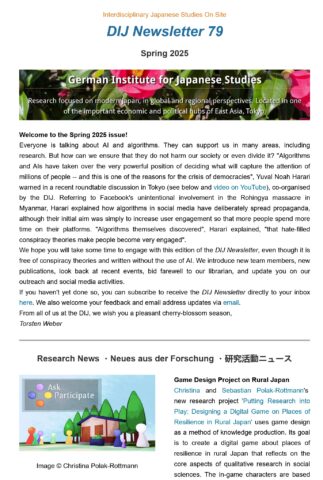
The spring issue of our DIJ Newsletter features updates on our research, publications, and events as well as news from the Institute, our team, and our outreach activities. We hope you will enjoy exploring this new edition of the DIJ Newsletter. If you haven’t done so yet, you can subscribe to receive our Newsletters directly to your inbox. The full issues and subscription form are available here.
New issue of Contemporary Japan published
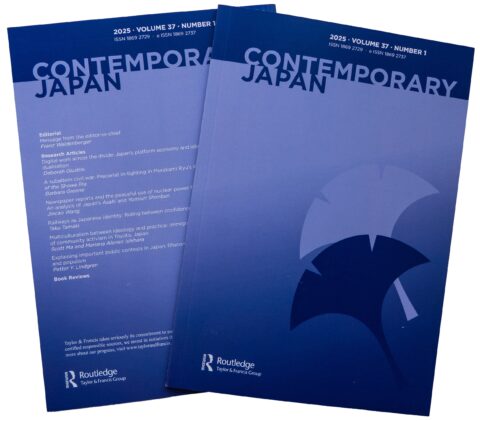 The new issue of Contemporary Japan includes research articles on new forms of labor market dualization in the platform economy (Deborah Giustini), an analysis of Murakami Ryu’s Popular Hits of the Showa Era from the perspective of precarity (Barbara Greene), a discussion of media discourses of the peaceful use of nuclear power in the early postwar period (Jincao Wang), an analysis of Japanese identity construction through railway technology (Taku Tamaki), narratives of multiculturalism and community-building among Nikkei in the city of Toyota (Scott Ma and Mariana Alonso Ishihara), and an assessment of political rhetoric, public contest outcomes, and populism in 21st century Japanese politics (Petter Lindgren). The book review section covers publications on Jesuit enterprise in Japan in the sixteenth and seventeenth centuries, on the impact of the bombings of Hiroshima and Nagasaki on psychological science, on East-West encounters in Japanese art, and on the history of the Japanese business community in Düsseldorf.
The new issue of Contemporary Japan includes research articles on new forms of labor market dualization in the platform economy (Deborah Giustini), an analysis of Murakami Ryu’s Popular Hits of the Showa Era from the perspective of precarity (Barbara Greene), a discussion of media discourses of the peaceful use of nuclear power in the early postwar period (Jincao Wang), an analysis of Japanese identity construction through railway technology (Taku Tamaki), narratives of multiculturalism and community-building among Nikkei in the city of Toyota (Scott Ma and Mariana Alonso Ishihara), and an assessment of political rhetoric, public contest outcomes, and populism in 21st century Japanese politics (Petter Lindgren). The book review section covers publications on Jesuit enterprise in Japan in the sixteenth and seventeenth centuries, on the impact of the bombings of Hiroshima and Nagasaki on psychological science, on East-West encounters in Japanese art, and on the history of the Japanese business community in Düsseldorf.
Blindness as disability: New book chapter by Carolin Fleischer-Heininger analyses novel by Gunji Nanae
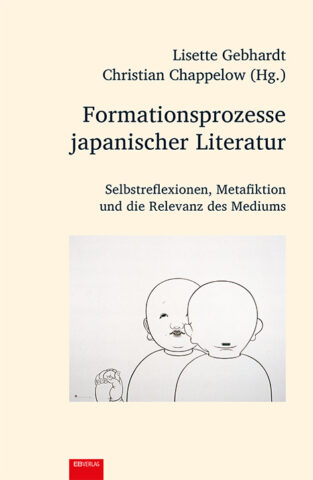
DIJ researcher Carolin Fleischer-Heininger’s latest publication “Perspektiven auf Blindheit in Beruna no shippo (1996) von Gunji Nanae“ studies the discussion of blindness as a disability in Gunji’s autobiographical novel Beruna no shippo. A close reading, taking into account theories from Disability Studies, shows that the novel is aimed at a general public that promotes guide dogs. At the same time, the novel portrays blindness – in particular with regard to mobility and motherhood – as a difference and as a deficit. Carolin’s analysis is preceded by an introductory section on the author, the novel, and the context in which it was written and received. It also includes comments on blindness as a disability in Japan and in Japanese literature as well as a review of related research. Her chapter was published in Formationsprozesse japanischer Literatur: Selbstreflexionen, Metafiktion und die Relevanz des Mediums (EB-Verlag 2025), edited by Lisette Gebhardt and Christian Chappelow.
Open access article co-authored by Sébastien Lechevalier studies impact of digitalization on job satisfaction
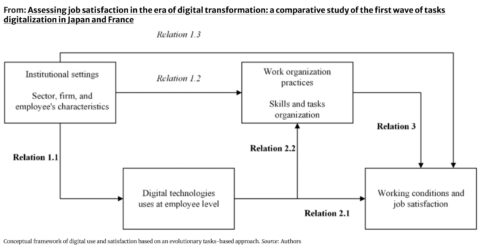 A new open access paper, co-authored by DIJ’s Sébastien Lechevalier and Malo Mofakhami analyses the diverse effects of the first wave of digitalization on job satisfaction through a comparison between Japan and France. The study neither finds substantial differences between the two countries regarding the impact of digital use on work organization practices nor a direct effect of digital use on job satisfaction. However, digital use is correlated to some work organization practices, such as autonomy, flexibility, and learning, through which it has positive mediated effects. The major source of the digital divide, in terms of satisfaction, is, in both countries, related to the perceived absence of digital skills by some workers. „Assessing job satisfaction in the era of digital transformation: a comparative study of the first wave of tasks digitalization in Japan and France“ is published online first in the European Business Review (Springer).
A new open access paper, co-authored by DIJ’s Sébastien Lechevalier and Malo Mofakhami analyses the diverse effects of the first wave of digitalization on job satisfaction through a comparison between Japan and France. The study neither finds substantial differences between the two countries regarding the impact of digital use on work organization practices nor a direct effect of digital use on job satisfaction. However, digital use is correlated to some work organization practices, such as autonomy, flexibility, and learning, through which it has positive mediated effects. The major source of the digital divide, in terms of satisfaction, is, in both countries, related to the perceived absence of digital skills by some workers. „Assessing job satisfaction in the era of digital transformation: a comparative study of the first wave of tasks digitalization in Japan and France“ is published online first in the European Business Review (Springer).
Book chapter by Carolin Fleischer-Heininger studies literary visions of the future

A new book chapter by DIJ researcher Carolin Fleischer-Heininger analyses the novel ‘Chiryō-tō’ (Therapy Station, 1990) by the Japanese Nobel Prize laureate Ōe Kenzaburō with regard to its two contrasting visions of the future. The first shows a technology-based, exclusive society of the ‘chosen’, the second an inclusive community of ‘failures’. Using the depiction of intellectual disability – particularly through the character of Hikari – the novel criticises destructive narratives of progress and creates a vision of a more humane society. The text is interpreted as a time-critical commentary on Japan’s affinity for technology and as a plea for more inclusion. Carolin’s chapter „Zwischen destruktivem Fortschritt und inklusiver Menschengerechtigkeit: Zukunftsentwürfe als Zeitkritik und Kompass in Chiryō-tō von Ōe Kenzaburō (1935–2023)“ is published in the volume Regenerative Zukünfte und künstliche Intelligenz: SDG-Forschung, Konzepte, Lösungsansätze zur Nachhaltigkeit (SpringerVS 2024), co-edited by Kai Gondlach, Birgit Brinkmann, Mark Brinkmann, and Julia Plath.
DIJ Newsletter Winter 2024/25
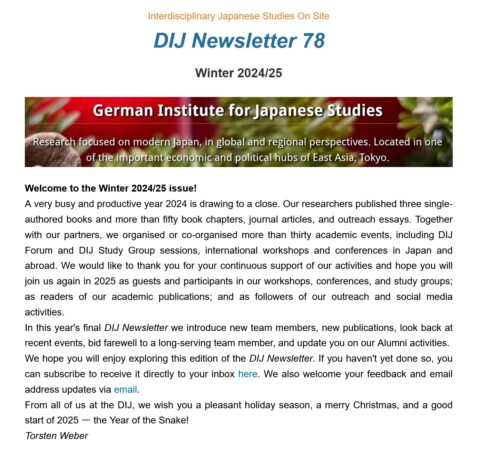 The winter issue of our DIJ Newsletter features updates on our research, publications, and events as well as news from the Institute, our team, and our alumni. We hope you will enjoy exploring this new edition of the DIJ Newsletter. If you haven’t done so yet, you can subscribe to receive our Newsletters directly to your inbox. The full issues and subscription form are available here.
The winter issue of our DIJ Newsletter features updates on our research, publications, and events as well as news from the Institute, our team, and our alumni. We hope you will enjoy exploring this new edition of the DIJ Newsletter. If you haven’t done so yet, you can subscribe to receive our Newsletters directly to your inbox. The full issues and subscription form are available here.
New book chapter by D.A. Neuhaus on Korea and the League of Nations
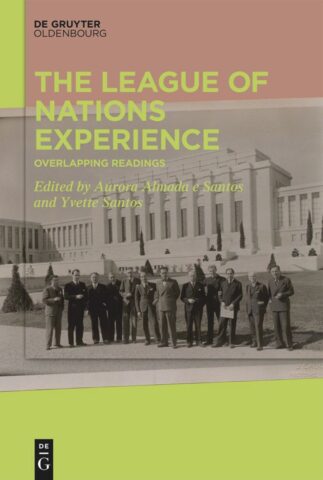
In his chapter “Korea and the League of Nations: from Versailles to the Manchurian Crisis, 1919–1933” Dolf-Alexander Neuhaus examines the relationship between the Korean independence movement and the League of Nations. The chapter elucidates the complex interactions between non-sovereign entities like Korea under Japanese rule and the international organization, offering insights into how Koreans and anti-Japanese nationalists perceived and engaged with the League of Nations during the interwar period. In 1919, when the League was established, Koreans were denied the right to self-govern. However, individuals and factions within the Provisional Government of the Republic of Korea still sought to utilize the League for their ends in the 1920s and early 1930s. By exploring these diplomatic and political dynamics, the chapter presents a nuanced picture of Korea’s struggle for recognition and national self-determination within the broader context of international politics. The chapter is published in The League of Nations Experience: Overlapping Readings (De Gruyter 2025).
New book chapter by Nicole M. Mueller studies reception of Thomas Mann in Japan

In her book chapter „Thomas Mann bei Mishima Yukio, Kita Morio und Tsuji Kunio: Verehrungspathos und Neuverortung als Vorbedingungen einer produktiven kulturüberschreitenden Rezeption“ (in German), DIJ researcher Nicole M. Mueller sheds new light on the reception of Thomas Mann’s literary works by the Japanese authors Mishima Yukio, Kita Morio, and Tsuji Kunio. The idealization of Mann had been an essential element of Japan’s cultural modernization and westernization in the first decades of the 20th century, making him one of the larger-than-life figureheads of Japan’s prewar academic elite. Mishima and his contemporaries developed novel modes of reception based on a critical analysis of Mann’s work. Nicole’s chapter examines the extent to which Mishima’s, Kita’s, and Tsuji’s reception of Mann was conditioned by historical context and what characteristics make cross-cultural literary reception “productive”. The chapter is published in the edited volume Thomas Mann produktiv rezipiert. Zum Fortleben von Werk und Autor (Brill/Fink 2025).





 Open Access
Open Access 
